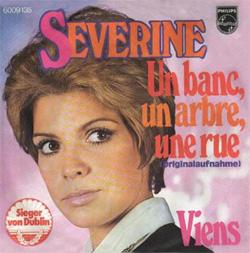Un banc, un arbre, une rue
1971 song by Séverine From Wikipedia, the free encyclopedia
"Un banc, un arbre, une rue" (French pronunciation: [œ̃ bɑ̃ œ̃n‿aʁbʁ yn ʁy]; "A Bench, a Tree, a Street") is a song recorded by French singer Séverine, with music composed by Jean-Pierre Bourtayre and French lyrics written by Yves Dessca. It represented Monaco in the Eurovision Song Contest 1971 held in Dublin, resulting in the country's only ever win in the contest.
| "Un banc, un arbre, une rue" | |
|---|---|
 | |
| Single by Séverine | |
| from the album Un banc, un arbre, une rue | |
| Language | French |
| B-side | "Viens" |
| Released | 1971 |
| Genre | Bubblegum pop[1] |
| Label | Philips |
| Composer(s) | Jean-Pierre Bourtayre |
| Lyricist(s) | Yves Dessca |
| Eurovision Song Contest 1971 entry | |
| Country | |
| Artist(s) | Josiane Grizeau |
| As | |
| Language | |
| Composer(s) | Jean-Pierre Bourtayre |
| Lyricist(s) | Yves Dessca |
| Conductor | |
| Finals performance | |
| Final result | 1st |
| Final points | 128 |
| Entry chronology | |
| ◄ "Marlène" (1970) | |
| "Comme on s'aime" (1972) ► | |
Background
Summarize
Perspective
Conception
"Un banc, un arbre, une rue" was composed by Jean-Pierre Bourtayre with French lyrics by Yves Dessca. It is a classic French ballad, with the lyric focusing on the loss of childhood innocence, and people following their dreams. The opening lines to the chorus translate as "we all have a bench, a tree, a street / Where we cherished our dreams / a childhood that has been too short". Séverine recorded the song in four languages; French, English –as "Chance in Time"–, German –"Mach' die Augen zu (und wünsch dir einen Traum)"–, and Italian –"Il posto"–.[2]
Eurovision
Télé Monte-Carlo (TMC) internally selected "Un banc, un arbre, une rue" as its entry for the 16th edition of the Eurovision Song Contest.[3]
A promo video was release where Séverine sings the song in the empty square of Monte Carlo, first walking to a bench, then sitting down while performing the middle verses, and then ending the song by walking away out of camera focus.[4]
On 3 April 1971, the Eurovision Song Contest was held at the Gaiety Theatre in Dublin hosted by Radio Telefís Éireann (RTÉ), and broadcast live throughout the continent. Séverine performed "Un banc, un arbre, une rue" third on the evening accompanied by four teenage male backing singers, following Malta's "Marija l-Maltija" by Joe Grech and preceding Switzerland's "Les Illusions de nos vingt ans" by Peter, Sue & Marc. Jean-Claude Petit conducted the event's live orchestra in the performance of the Monegasque entry.[5]
By the close of voting, it had received 128 points, placing it first in a field of eighteen, and winning the contest. It received the then maximum score of 10 points from six voting nations. This song holds the record of receiving the most 10 point scores from this voting era.[6] It was succeeded as contest winner in 1972 by "Après toi" by Vicky Leandros for Luxembourg. It was succeeded as the Monegasque representative that year by "Comme on s'aime" by Peter McLane and Anne-Marie Godart.
Aftermath
Séverine performed her song in the Eurovision twenty-fifth anniversary show Songs of Europe held on 22 August 1981 in Mysen.[7]
Chart performance
Despite the existence of an English version, however, it was the original French version which reached the UK Top 10, a rare non-Anglophone hit in that market.
Weekly charts
| Chart (1971) | Peak position |
|---|---|
| Belgium (Ultratop 50 Flanders)[8] | 3 |
| Belgium (Ultratop 50 Wallonia)[9] | 1 |
| France (IFOP)[10] | 4 |
| Germany (Media Control) | 23 |
| Ireland (IRMA)[11] | 3 |
| Netherlands (Dutch Top 40)[12] | 15 |
| Norway (VG-lista)[13] | 2 |
| Switzerland (Schweizer Hitparade)[14] | 5 |
| UK Singles (OCC)[15] | 9 |
Legacy
Paul Mauriat released an instrumental version of the song on his 1971 LP of the same title. His version was adapted in 1973 by Television Broadcasts Limited as the theme tune for their Miss Hong Kong Pageant, and has since then been familiar to generations of Hong Kong residents.[16] Also in 1971, Finnish singer Carola Standertskjöld recorded her version in Finnish, "Penkki, puu ja puistotie", Siw Malmkvist recorded a Swedish version, "På en gammal bänk" ("On an old bench"), Kirsti Sparboe recorded it in Norwegian as "På en gammel benk" (On an old bench) and Heli Lääts and Liilia Vahtramäe recorded an Estonian version "Tänav, pink ja puu" ("A Street, a Bench and a Tree").
References
External links
Wikiwand - on
Seamless Wikipedia browsing. On steroids.
